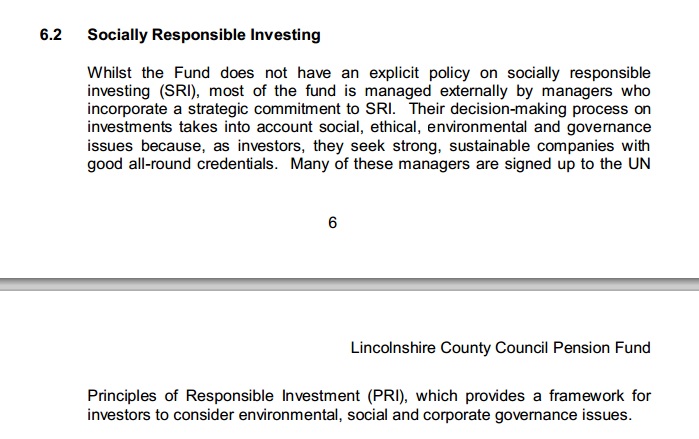Lincs defends 'pseudo-passive' equities in fracking furore
Yesterday's Independent newspaper reported Lincolnshire County Council Pension Fund is leading a group of schemes in denying a conflict of interest over its £1.5m investment in French oil company Total, which is exploring shale gas exploration in the area, rendering Lincolnshire the latest scheme to have to defend publicly an underlying investment.
The fund's local paper, the Lincolnshire Echo, reported the story today:
County council denies conflict of interest over pension fund investment into French firm spearheading fracking http://t.co/8GRbHVATQH
— Lincolnshire Echo (@LincsEcho) April 28, 2014Total has invested £30m into two shale gas exploration sites in the county, which the paper suggested raised questions over the independence of the decision to award licenses to extract the energy source.
Anti-fracking campaigners pounced on it:
#Fracking: Lincolnshire County Council denies conflict of interest over pension scheme investment in Total http://t.co/HeQzNZN7wd
— Gasfield Free Mendip (@GFFMendip) April 28, 2014A spokesperson for the scheme said the investment was made about 10 years ago in a global equities mandate which is "pseudo-tracking" and so it would hold companies such as Total.
He said: "[The investment had] no bearing and there was no overlap between the committee and the pension. It is completely unrelated."
The scheme has approximately £1.5m invested in the oil company which is run through an external manager, the spokesperson said.
The Echo has the following comment from the council's assistant director of resources: "The pension scheme operates within a set of clear investment principles and is overseen by a pension committee, which makes its decisions wholly independently from the county council. Councillors who sit on this committee do not sit on the planning committee, and so have no bearing over planning applications.
"The pension committee has a legal duty to achieve the best rate of return possible on investments. For this reason, the pension fund maintains a wide and varied portfolio, much of which is managed externally by fund managers who seek strong, sustainable companies with good all-round credentials."
Shale gas extraction, known as fracking, has come under fire from environmentalists who say the process of injecting water, sand and chemicals into shale rock to release the oil can contaminate groundwater.
The scheme's statement of investment principles does not have an "explicit policy on socially responsible investing".
Source: Lincolnshire County Council Pension Fund
Lincolnshire is not the first scheme to come under scrutiny for its investments. Last year, it was found the Church of England was invested in short-term lender Wonga, after the Archbishop of Canterbury Justin Welby deemed payday lenders "morally wrong" and vowed to take on the industry.
At the time, a spokesperson for the church said the current ethical policies allow for the blind commitment of capital associated with private equity investments – both management buyouts and venture capital – adding: "As a result of this we are carrying out a review of our policies to see if any changes need to made."
The Law Commission is expected to publish by June its recommendations on the fiduciary duty of investment intermediaries, including pension funds, following a consultation that closed in January.
This will look at how far scheme investors can take into account the non-financial factors affecting investments, such as their environmental and social impact, and will consequently be a crucial intervention in this debate.
Most Viewed
- What does Labour have in store for the pensions industry?
- ‘We need a consensus’: Sir Stephen Timms calls for higher contributions
- Border to Coast launches UK strategy in major private markets push
- Five themes at the forefront of a sustainable future
- How the pensions industry can better support people with mental health problems


